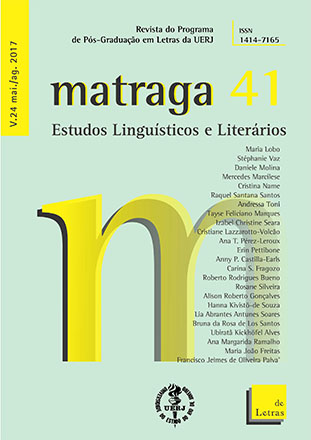Voicing of the English -s morpheme by Brazilian learners: the influence of phonological rules of the L1 on the L2
DOI:
https://doi.org/10.12957/matraga.2017.28568Keywords:
L2 Acquisition, Phonological Rule, Voicing AssimilationAbstract
This work aims at investigating the acquisition of the English -s morpheme voicing by speakers of Brazilian Portuguese (BP). Voicing assimilation, which consists of extending the [voice] feature from one segment to another, occurs both in BP and in English, but in a different way. While in BP the assimilation is regressive, since it is triggered by the voicing of the following context (e.g.: me[z]mo), in English it is progressive, as it occurs due to the preceding context (e.g.: dog[z], cat[s]). The sample is composed of 30 Brazilian speakers of English as a second language divided into three proficiency levels (basic, intermediate and advanced), plus 7 native English speakers (control group). The data were collected through an experiment containing 60 words with the fricative /z/ in final position, which were read by the subjects and acoustically verified. The results showed that the application of voicing was favored by voiced segments in the following context, an evidence that it is the voicing of the following context, rather than the preceding one, that influenced the production of voiced fricatives in the contexts under analysis. This is confirmed if we consider that voicing was applied in only 1% of cases of fricative followed by voiceless consonants or pauses (12/1121), contexts in which regressive assimilation could not occur. Therefore, the results showed a transference of the L1 rule to the L2, since the subjects applied the regressive voicing assimilation in the three proficiency levels.
---
DOI: http://dx.doi.org/10.12957/matraga.2017.28568
Downloads
Downloads
Published
How to Cite
Issue
Section
License
Authorization
Matraga – Scientific Journal of the Post-graduate Program in Arts and Humanities of UERJ is authorized to publish the article submitted here, if it is accepted for online publication. It is attested that the contribution is original, that it is not being submitted to another publisher for publication, and that this statement is the expression of truth.
The works published in Matraga's virtual space – Scientific Journal of the Post-graduate Program in Arts and Humanities of UERJ will be automatically transferred, and your copyright is reserved to Matraga. Its reproduction, in whole or in part, is conditional on the citation of the authors and the data of the publication.

Matraga uses license Creative Commons - Attribution-Non-Commercial 4.0 International.





